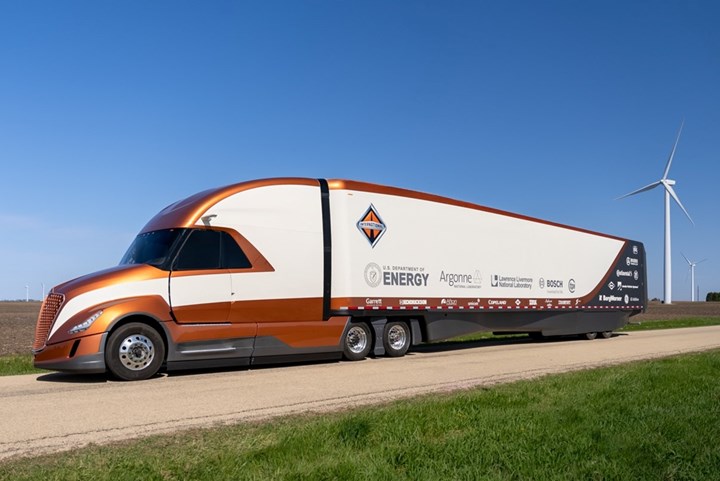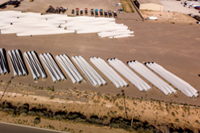TPI Composites manufactures structural composites for International SuperTruck II
The program, co-funded by the DOE and Navistar, highlights improved fuel and freight efficiency and goals for hybridization for Class 8 trucks, further achieved by an all-composite cab, trailer box and aero package.
TPI Composites Inc. (Scottsdale, Ariz., U.S.) has partnered with Navistar Inc. (Lisle, Ill., U.S.) on an all-composite cab, trailer box and aero package for the International SuperTruck II.
The project, which was co-funded by the U.S. Department of Energy (DOE) and Navistar, brought together leaders in their respective industries to design and manufacture a Class 8 vehicle that demonstrates the future of hybridization and aerodynamics. The lightweight, aerodynamically designed composite cab and trailer components were manufactured by TPI. In addition, the vehicle achieved 16 miles per gallon in real-world operation and a 170% improvement in freight efficiency, among other advancements over the 2009 baseline International SuperTruck I.
With faster development times, lower investment costs and reductions in mass when compared to traditional metallics, composites are becoming more prevalent structural solutions as the commercial truck market migrates to zero-emission vehicles. TPI notes that the replacement of steel and aluminum with composites can provide significant weight reduction and design flexibility; the International SuperTruck II demonstrates this by shedding 500 pounds with the aero package when compared to its predecessor.
“The combination of Navistar’s extensive vehicle knowledge combined with TPI’s advanced composite design and material expertise is demonstrated by the results of this U.S. Department of Energy program,” Todd Altman, senior director of automotive at TPI, says. “We are excited to be a part of delivering the next generation of commercial vehicles.”
TPI engineers at the Innovation and Technology Center in Warren, R.I., U.S., collaborated with the Navistar team to design the structures, fabricate the tooling and build the components. Dean Oppermann, chief engineer of advanced technologies at Navistar, notes that, “TPI’s ability to respond quickly to design modifications and component additions allowed us to continue to develop the requirements late into the project and still have quality hardware that meet project deliverables. TPI’s design staff were able to effectively balance weight, cost and functionality to meet International SuperTruck goals of freight efficiency with technologies that have near-term business case feasibility. It has been exciting to see how far composite technology has come and where it is going, and I am proud to be part of this collaboration.”
For related material, read “Bio-inspired EV underbody panel developed by TPI Composites, Helicoid Industries.”
Related Content
-
Infinite Composites: Type V tanks for space, hydrogen, automotive and more
After a decade of proving its linerless, weight-saving composite tanks with NASA and more than 30 aerospace companies, this CryoSphere pioneer is scaling for growth in commercial space and sustainable transportation on Earth.
-
Price, performance, protection: EV battery enclosures, Part 1
Composite technologies are growing in use as suppliers continue efforts to meet more demanding requirements for EV battery enclosures.
-
Materials & Processes: Composites fibers and resins
Compared to legacy materials like steel, aluminum, iron and titanium, composites are still coming of age, and only just now are being better understood by design and manufacturing engineers. However, composites’ physical properties — combined with unbeatable light weight — make them undeniably attractive.











.jpg;maxWidth=300;quality=90)





